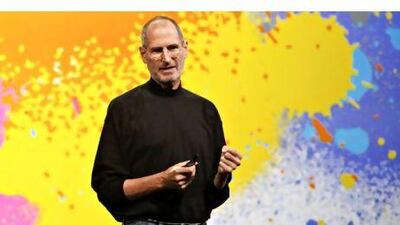Few multinational companies have as much vested in one person as Apple has in the company's chief executive, Steve Jobs.
Mr Jobs, who announced this week that he was taking another leave of absence from Apple for health reasons, does not just epitomise the brand, being the face of the company at public events, he is also seen as the source of the company's strategic genius and legendary product innovation.
Not many other chief executives fall into that category, with Virgin's Sir Richard Branson being one of the notable exceptions. Bill Gates used to embody Microsoft's reputation in the way that Steve Jobs still does Apple's, but he has long since stepped away from the day-to-day running of the business. Even when Jack Welch was at the helm of General Electric, where his management style became a template for corporations around the world, there was no feeling that if he sneezed, the rest of his company would catch a cold.
Certainly, it has been Mr Jobs's famously hands-on reputation at the company that he co-founded back in 1976 that has led to Apple's remarkable transformation over the last decade, the launch of ground-breaking products such as the iMac, iPod, iPhone and iPad, and its position today as the world's largest technology company by market capitalisation. Which is presumably why the company seems reluctant to accept the fact that having its future so tied up in the future of its founder is also one of its greatest weaknesses.
Despite the fact that Jobs has taken time off from the company twice before since he was first treated for pancreatic cancer in 2004, Apple still encourages the perception that its public reputation relies on him being at the helm. This has stoked even greater fears that, rather than learning from its chief executive's previous bouts of ill health, the company has yet to get a grip on its succession strategy.
This perception was only strengthened when, in an e-mail to employees released on Monday, Mr Jobs said that while he was handing over day-to-day operations to the chief operating officer, Tim Cook, he would continue as chief executive and still "be involved in major strategic decisions at the company".
The perception was also strengthened by news from an Apple representative that the company was not going to release any more details about the health of Mr Jobs, although lack of information on this front has given investors cause for concern for the past seven years.
Speculation about his health in the months leading up to January 2009, when Mr Jobs last took a medical leave of absence from the company for what turned out to be a liver transplant, caused Apple's stock to drop, although it recovered by the time he returned to work in June 2009.
This time, the level of uncertainty is even greater. In his e-mail to employees, Mr Jobs gave no particular medical reason for his leave of absence or indication of when he would return. In January 2009, he wrote in a note to employees that although it would take him until late that spring to recover, he would be back at work in the summer. In his short written statement on Monday, he said only that he hoped to return to work as soon as he could.
This uncertainty, along with its potential to damage the company, is already being felt. Although US markets were closed for the Martin Luther King holiday on Monday, Apple shares fell 6.2 per cent in Frankfurt to close at €244.05, US stock futures also dropped before recovering on Tuesday.
It seems time for Apple to give Mr Cook responsibility for the day-to-day running of the company on a permanent basis. Mr Jobs has every right to keep his medical condition private, just as he and all his fans around the world are right to focus on his recovery. However, his company needs to accept the consequences, which is that it must prove once and for all that it can exist without him.

